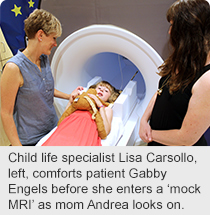
June 30, 2015
Story and photo by Janet Mezzarobba
Undergoing an MRI can be a stressful experience for patients — especially children, who are asked to keep still in a tight space while surrounded by loud noises.
Now the Alberta Children’s Hospital (ACH) has the only simulator of its kind in Alberta, designed to give young patients the MRI experience before having to undergo the real thing.
The goal is to help children be more comfortable and less fearful within the MRI scanner, reducing the need for anesthesia to keep them calm. About 50 youngsters have used the ‘mock MRI’ since it went into operation last April.
 About 80 patients undergo an MRI every week at Alberta Children’s Hospital every week.
About 80 patients undergo an MRI every week at Alberta Children’s Hospital every week.
"When patients first try the mock MRI, they often feel a little anxious, unsure, even intimidated,” says Lisa Carsolio, a child life specialist at Alberta Children’s Hospital.
“With information on what to expect and some reinforcement through practice, the patient and their family can leave feeling calmer, more prepared and more confident. The mock MRI helps provide understanding and familiarity which, in turn, promotes comfort and confidence.”
The mock MRI has the look, sound and feel of a real MRI, plus the added bonus of a motion- tracking system to analyze if the patient moves around during the exam. Moving during any portion of an MRI could result in having to redo portions of the test, which generally lasts anywhere from 20 to 60 minutes.
Andrea Engels says the mock MRI helped both her and her five-year-old daughter Gabby.
“The mock MRI definitely helped Gabby be much calmer and know what to expect,” says Engels. “We went through the mock MRI twice in our practice session to ensure Gabby was completely comfortable. After we left the mock session, we knew exactly what to expect and felt we were ready for the real thing.
“During the real MRI, the technologist told us we got excellent images on the first try and we didn’t have to use any anesthetic, which was a huge relief.”
The mock MRI is also being used to facilitate important research at the hospital.
“The mock MRI has helped us prepare children for scans that enable us to examine brain development and brain disorders in children, including autism and depression,” says Dr. Catherine Lebel, Assistant Professor of Radiology at the University of Calgary.
Dr. Lebel and her team have used the mock MRI to let children practice before research MRI scans, making the entire experience less scary.
“The mock MRI has helped us enhance the overall experience for children and their families,” Dr. Lebel says.
The mock MRI is used primarily for children under the age of seven, but can also be used on older children experiencing anxiety, or for those who may be frightened by loud noises or experience claustrophobia.
The mock MRI was donor-funded through the Alberta Children’s Hospital Foundation and purchased as part of a Canada Foundation for Innovation research grant through the University of Calgary.